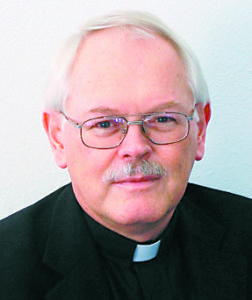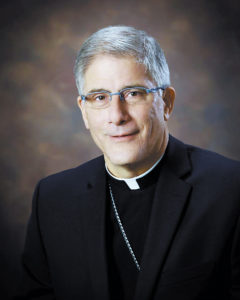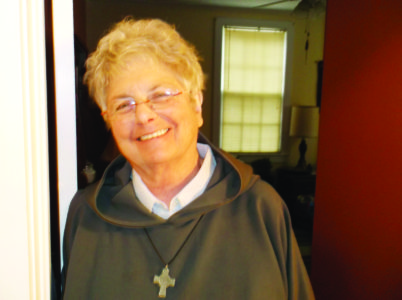
Sister alies therese
From the Hermitage
By Sister alies terese
Wide, broad, expansive, all-inclusive? How would you describe your orbit…your sphere of influence? Maybe you’ve had an experience (or series of them) like Robert Maynard, the first African-American editor of a major metropolitan daily newspaper, The Oakland Tribune? At 29 he received a coveted Neiman Fellowship at Harvard where he reflected: “I assumed that Harvard, a great institution founded by Congregational ministers, surely would help me understand how intellect should play a role in achieving social justice. Instead I got there and found myself confronting more bigotry than I had ever expected to find in a place of enlightenment. For years I was puzzled by that experience.” He subsequently heard the preaching of Dr. Wil Herzfeld about the Pharisees who were steeped in learning’s light but resisted the source of that light. That was it! That was his Harvard experience. He framed the sentence and hung it on the wall in his office where it remained until he died: “They are steeped in the light of learning, but they resist the source of the light.” His circle of influence grew yet what he suffered was wicked.
The fact that we all live in an affluent society does not mean that all are affluent or even going in that direction! In fact, how we break down our understanding of that affluence is critical and very different from one another. It might even be shocking to some of us that our desire to ‘help the poor’ can be rather misplaced and even toxic.
In 2005 Dr. Ruby Payne developed some visuals that helped me understand these circles of influence. She maintains that “there is a correlation between knowledge and what you spend your time doing.”
By actually talking with poor people she reported that time is primarily spent on relationships: “child care, food, criminal justice system, housing, mental health, chemical dependencies, health, safety, jobs, friends and family, transportation, debt, clothing, agency time, entertainment and children.”
She posed the very same questions to a number of middle class folks (she defines middle class as those having a stability of resources, not just money) and how their time was spent: achievement: “education, prevention, political action, mental health, chemical dependency, health, clubs/civic groups/volunteering, family and friends, transportation, hobbies/sports, shopping, vacations, childrens’ activities, child care, debt, careers, retirement.”
The third group, people of wealth, in answering the same questions, reported the following: connections: “keeping up, vacation, available cash for memberships, sponsorship of events and attendance, travel, media and political linkages, charitable activities, oversight of corporate property/personal concerns, growing divide between rich and super rich, private clubs and associations, boards of directors, national and international advisors, lawyers and accountants.”
I very much like her alternate terminology, however. Rather than poverty, middle class, and wealth she prefers ‘resourced’ and ‘under-resourced’. Her list of ‘resourced’ includes the following: “stability, exposure, functionality, abstract representational reality, written, formal register, option seeking, abundance, work/careers/larger cause, wealth, more educated.”
Under-resourced includes: “instability/crisis, isolation, dysfunction, concrete reality, casual, oral language, thought polarization, survival, no work/intermittent work, poverty, and being less educated.”
I suggest that we do not understand our starting-off points and thus our desire to serve is misplaced. It is about us…and not ‘the poor’. When this is the case, we are trapped by only seeing things from one point of view: ours.
For example, I read about a well-resourced parish, not here, where a group of well-meaning folk decided to go to a country on the African continent and put in fresh water wells. It cost the group nearly $35,000 to go, making sure as many teens as possible could ‘experience’ it. When they arrived they were welcomed by the people. The group set to work digging holes and completing the project, as the people of the village watched.
Some days later the group left, high on their good works, and the people indeed had some fresh running water. The women no longer needed to walk 3-5 miles each morning for water…pick this apart and notice how the group began with achievement, but the people began with a desire for relationships. Some no doubt were established but 6 months after they returned the teens could not name one person in the village correctly. They could talk a lot about themselves, however, and how hard they worked.
Within the year, sadly, one of the main plastic pipes broke away and caused the water flow to stop. The group had left no instructions on how to fix or (money) resources to do so. No one had been trained. The women began their 3 mile walk again, and chatted as they went. Had they worked together, had they sat at table more often, had they celebrated ‘church’ together during the time they were there…the experience might have been very different. They might have discovered the source…
How do you experience your circle of influence? How are you following the Light toward the Source? Are you steeped in the light of learning or are you still resisting the source of the light? BLESSINGS.
(Sister alies therese is a vowed Catholic solitary who lives an eremitical life. Her days are formed around prayer, art and writing. She is author of six books of spiritual fiction and is a weekly columnist. She lives and writes in Mississippi.)

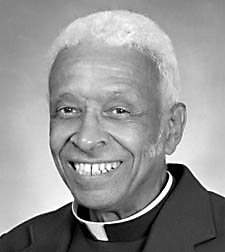
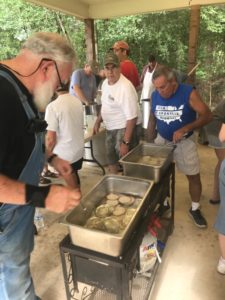 GLUCKSTADT– Wesley Gannon, closest to the camera, Billy Endris and Paul Aubin boil the canning materials as they prepare sauerkraut for GermanFest 2018. The festival is a St. Joseph Parish tradition honoring the German roots of the community. The 32nd annual GermanFest is scheduled for Sunday, September 30, from 11 a.m. to 5 p.m. The day features lots of German delicacies, polka music, games for kids and a country store. Advance meal tickets are $6 and are available from parishioners of St. Joseph. Ticket information is also available by calling the parish office at (601) 856-2054. Meals the day of the festival will be $7. (Photo by Felicia Lobrano)
GLUCKSTADT– Wesley Gannon, closest to the camera, Billy Endris and Paul Aubin boil the canning materials as they prepare sauerkraut for GermanFest 2018. The festival is a St. Joseph Parish tradition honoring the German roots of the community. The 32nd annual GermanFest is scheduled for Sunday, September 30, from 11 a.m. to 5 p.m. The day features lots of German delicacies, polka music, games for kids and a country store. Advance meal tickets are $6 and are available from parishioners of St. Joseph. Ticket information is also available by calling the parish office at (601) 856-2054. Meals the day of the festival will be $7. (Photo by Felicia Lobrano)
